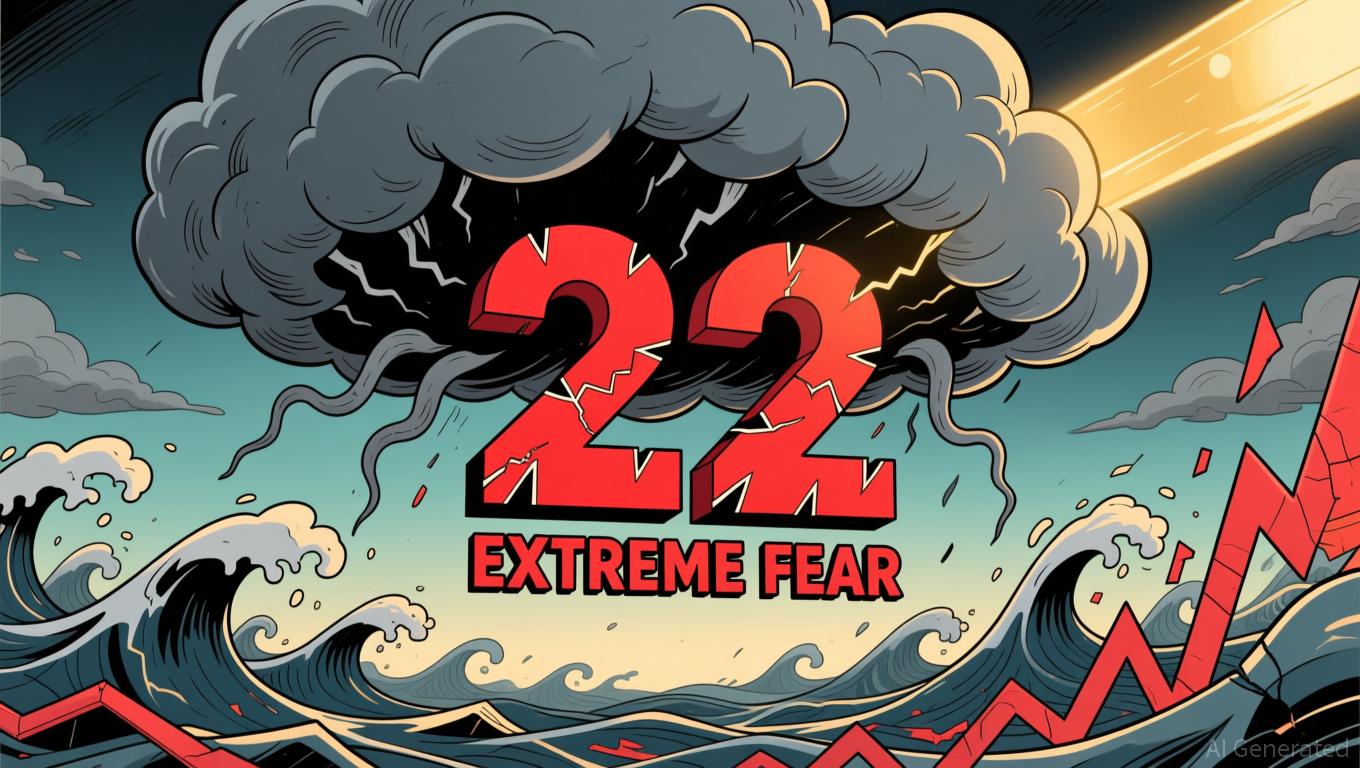ZK Atlas Enhancement: Driving Institutional Embrace Amid the Blockchain Scalability Competition
- ZKsync's Atlas Upgrade solves throughput bottlenecks with Airbender RISC-V zkVM, enabling 15,000+ TPS at $0.0001 per transaction. - Modular ZKsync OS reduces gas fees by 70% since 2023, enabling real-time financial applications while maintaining regulatory compliance. - Deutsche Bank and UBS test ZKsync for asset tokenization, highlighting its institutional appeal through privacy-preserving ZK features and sub-second finality. - Upcoming Fusaka upgrade aims to push TPS to 30,000 by December 2025, but reg
ZKsync Atlas Upgrade: Transforming Institutional Blockchain Adoption

The blockchain sector has consistently faced the challenge of achieving a balance between security, decentralization, and scalability. In 2025, the ZKsync Atlas Upgrade emerges as a game-changing development, setting new standards for both technology and economics within Ethereum Layer 2 (L2) solutions. By introducing the Airbender RISC-V zkVM and a modular ZKsync operating system, this upgrade not only overcomes throughput limitations but also meets the rigorous compliance and performance requirements of institutional users. This overview examines how Atlas's advancements could drive a new wave of institutional engagement in L2 solutions, fundamentally altering the blockchain infrastructure landscape.
Breakthrough Technology: Airbender zkVM and Modular OS
At the heart of the Atlas Upgrade is the Airbender RISC-V zkVM, which delivers over 15,000 transactions per second at a cost of just $0.0001 per transaction. This marks a significant improvement over traditional optimistic rollups like Arbitrum and Optimism, which depend on delayed finality for fraud detection. By compiling execution to RISC-V for proof generation, Airbender removes the risk of inconsistent logic between execution and verification, thereby boosting both security and efficiency.
Supporting this is the modular ZKsync OS, which has cut gas fees by 70% since 2023. This dramatic reduction is crucial for institutions aiming to launch real-time financial services, such as instant asset settlements or high-frequency trading. The modular design also empowers organizations to create private or semi-public Ethereum-linked chains while upholding regulatory standards and transparency. Notably, major banks like Deutsche Bank and UBS have already piloted ZKsync's infrastructure for asset tokenization, benefiting from its privacy-centric zero-knowledge features.

Driving Institutional Adoption: Compliance, Liquidity, and Instant Settlement
Historically, institutions have been reluctant to embrace blockchain due to hurdles such as regulatory uncertainty, fragmented liquidity, and inadequate performance. The Atlas Upgrade directly tackles these issues:
- Regulatory Alignment: The ZK Stack bridges liquidity between Ethereum's mainnet and Layer 2, minimizing fragmentation and enabling rapid cross-layer transactions. This is especially beneficial for institutions navigating complex regulatory landscapes, as it ensures smooth asset transfers with full auditability. ZKsync's governance—comprising the Token Assembly, Security Council, and Guardians—adds further protection against centralized control, a key concern for traditional finance.
- Real-Time Settlement: The upgrade introduces a next-generation sequencer capable of handling 25,000–30,000 transactions per second with near-instant finality. This is vital for applications that demand immediate transaction confirmation. For instance, Deutsche Bank's exploration of ZKsync for real-time asset tokenization highlights the platform's potential to replace outdated systems with lengthy settlement times.
- Enterprise-Ready Infrastructure: ZKsync enables the deployment of private chains with zero-knowledge privacy, making it highly attractive for regulated industries. Organizations can now implement blockchain solutions without exposing sensitive information, meeting the needs of sectors like healthcare and supply chain management.
ZKsync vs. Optimism and Arbitrum: A Comparative Perspective
Although Optimism and Arbitrum are well-established in the L2 ecosystem, the Atlas Upgrade positions ZKsync as the preferred choice for institutions that value high throughput and rapid finality. By late 2025, ZKsync boasts over 15,000 transactions per second with one-second finality, surpassing Optimism's and Arbitrum's daily transaction volumes. However, the latter platforms still offer advantages in developer tools and compatibility.
Governance models also set these platforms apart. ZKsync's multi-faceted governance structure offers a more decentralized approach compared to Optimism's token-based system, which may appeal to risk-conscious institutions. Meanwhile, Arbitrum's optimistic rollup, while developer-friendly, continues to lag in finality due to its reliance on challenge periods.
Looking Ahead: Fusaka Upgrade and Regulatory Challenges
The Atlas Upgrade is just one step in ZKsync's ongoing evolution. The forthcoming Fusaka upgrade, scheduled for December 2025, aims to increase throughput to 30,000 TPS while addressing interoperability and regulatory complexities. This progression signals ZKsync's ambition to become a foundational provider for institutional blockchain infrastructure.
Nevertheless, regulatory ambiguity remains a significant variable. While ZKsync's compliance-oriented design reduces certain risks, global regulatory bodies are still developing frameworks for tokenized assets and cross-border transactions. Institutions leveraging ZKsync must stay alert to shifting legal requirements, especially in regions like the EU and the United States.
Investment Perspective
For investors, the Atlas Upgrade represents a convergence of technological progress and growing institutional interest. The increasing total value locked in ZKsync's ecosystem reflects rising confidence in its capabilities. The upgrade's emphasis on instant settlement and regulatory compliance aligns with broader trends such as asset digitization and the demand for faster financial systems.
In comparison, Optimism and Arbitrum's dependence on optimistic rollups may limit their appeal to institutions that prioritize speed and certainty. While these platforms are likely to retain their user communities, ZKsync's technological advantages could enable it to capture a larger share of the institutional market, particularly in banking and asset tokenization.
Summary
The ZK Atlas Upgrade marks a pivotal moment for institutional blockchain adoption. By overcoming challenges related to scalability, compliance, and performance, ZKsync has established itself as a credible alternative to conventional financial infrastructure. As future upgrades like Fusaka roll out, the platform's ability to adapt to regulatory and technological changes will be key to its sustained leadership in the Layer 2 arena. For investors and institutions alike, ZKsync's advancements are not only redefining scalability but also shaping the future of blockchain in the enterprise world.
Disclaimer: The content of this article solely reflects the author's opinion and does not represent the platform in any capacity. This article is not intended to serve as a reference for making investment decisions.
You may also like
Switzerland Postpones Crypto Tax Data Exchange to Meet Technological and International Requirements
- Switzerland delays crypto tax data sharing until 2027, aligning with global regulatory reevaluations amid evolving tech and market dynamics. - SGS acquires Australia's Information Quality to boost digital revenue, reflecting Swiss firms' expansion into tech-driven compliance solutions. - Canada's Alberta oil sands policy shift highlights governments prioritizing economic growth over strict climate regulations, mirroring Switzerland's approach. - BridgeBio's precision medicine and Aires' EMF solutions dem

Switzerland's Focus on Privacy Conflicts with International Efforts for Crypto Taxation
- Switzerland delays crypto tax data sharing with international partners until 2027, contrasting with global regulatory efforts to close offshore loopholes. - The U.S. advances implementation of the OECD's CARF framework, aiming to automate reporting on foreign crypto accounts by 2029. - CARF requires foreign exchanges to report U.S. account details, mirroring traditional tax standards and targeting crypto tax evasion. - Switzerland's privacy-focused stance highlights tensions between financial confidentia

Zcash News Update: Reliance Shifts Entirely to Zcash, Citing Privacy and Regulatory Alignment
- Reliance Global Group, a Nasdaq-listed fintech firm, shifted its entire crypto portfolio to Zcash (ZEC), divesting Bitcoin , Ethereum , and other major coins. - The strategic pivot, announced November 25, prioritizes Zcash's privacy-focused zk-SNARKs technology for institutional compliance and selective data disclosure. - Zcash's 1,200% 90-day price surge and Grayscale's ETF filing highlight growing institutional interest in privacy-centric assets. - The move reflects broader crypto industry trends towar
Bitcoin News Update: Bitcoin Fear Index Drops to 22 While Investors Look for Signs of Market Rebound
- Bitcoin Fear & Greed Index rose to 22 from 20, indicating slight easing of extreme fear but persistent bearish sentiment. - Bitcoin stabilized near $87,000 after hitting $80,553, yet remains below key resistance levels amid $3.5B ETF outflows. - Structural factors like leverage and liquidations drive selloffs, with ETF redemptions correlating to 3.4% price drops per $1B outflow. - Analysts note oversold technical indicators and waning retail capitulation as potential inflection points for near-term rebou
